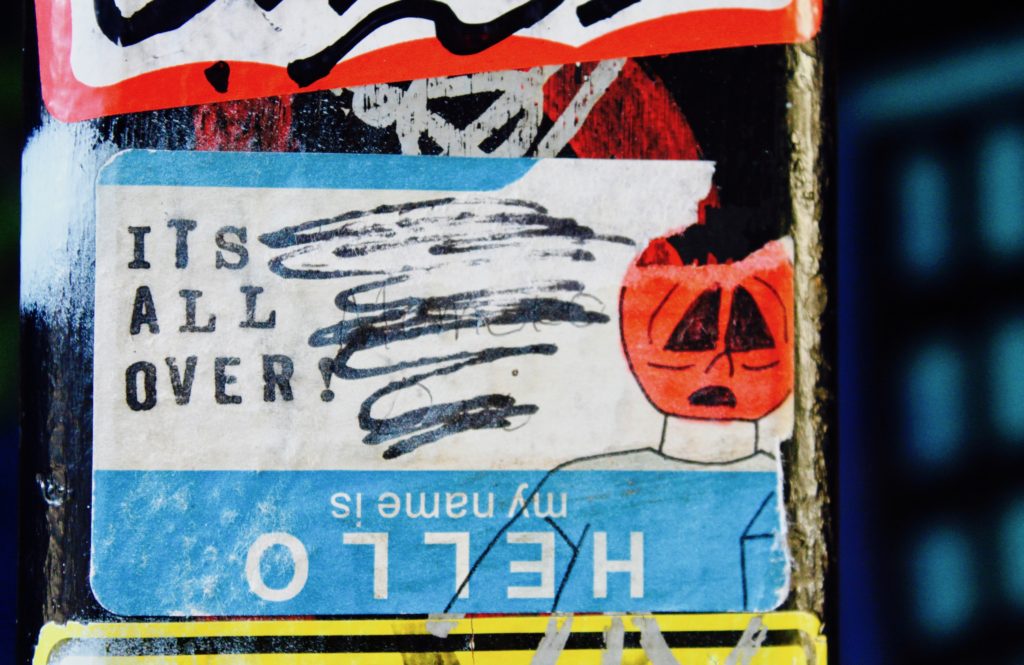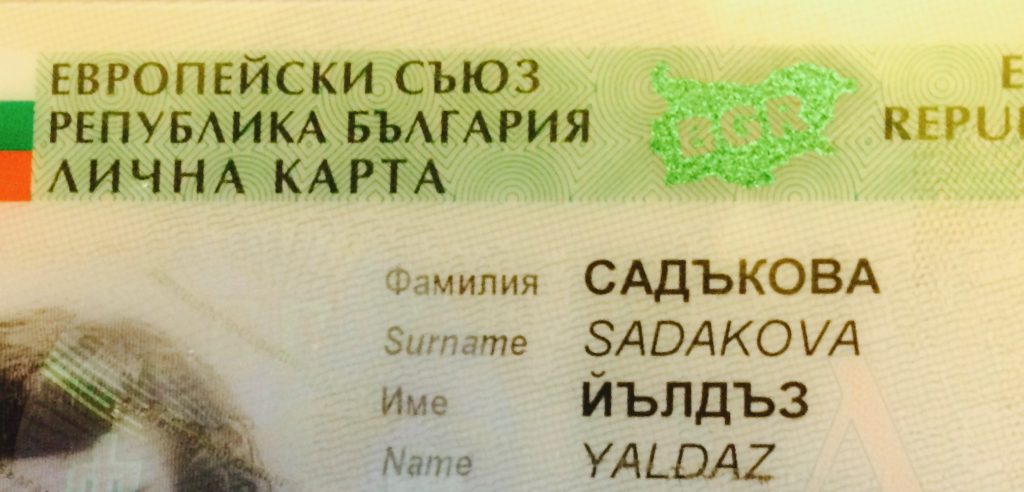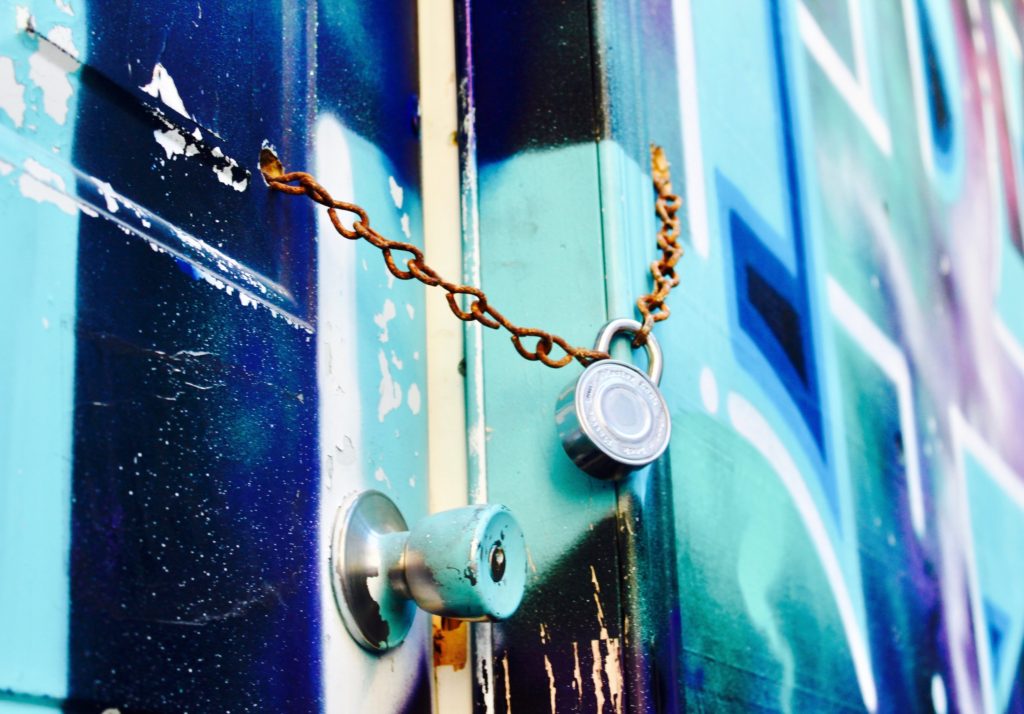By Yaldaz Sadakova

I hate my name.
Dale Carnegie was wrong when he famously wrote that “a person’s name is to that person the sweetest and most important sound in any language.”
Your name isn’t the sweetest sound if it gets butchered all the time, the way my name has always been.
Here’s a list of the wrong names I’ve been called over the years: Ildaz, Hilda, Yalza, Jalda, Zeldaz, Elduz, Yalda, Yeldaz, Yaldez, Yalduz.
Erased and Lost in Translation
My name problem didn’t start when I emigrated more than a decade ago, the way it happens for many immigrants.
It started in my native Bulgaria in the mid-1980s, when the Communist regime erased my name. I was a toddler at the time.
This happened as part of an oppressive assimilation campaign against Bulgaria’s Turkish Muslim minority, to which me and my family belonged.
The Communists wanted to create a “pure” nation, 100 percent ethnically Bulgarian.
Bulgaria’s Communist regime began forcible assimilation attempts against the country’s Turkish minority soon after it rose to power, in the mid-1940s.
But the campaign started in earnest in December 1984.
That’s when the government forced all citizens of Turkish descent to change their names.
Within three months of December 1984, often at gunpoint, 840,000 Bulgarian Turks had to renounce their Turkish names, mostly of Arabic origin, and replace them with Bulgarian ones, mainly Slavic and Christian.
Those who protested were killed or imprisoned.
For my family, it happened on a weekend morning, when two police officers showed up at our house.
At the time, me and my mom—a single parent—lived with my grandparents in a poor Turkish neighborhood in a small town.
My grandparents were driven to the police station. There, they dropped off their passports, which were no longer valid because they contained their Turkish names.
They chose random Bulgarian names.
Their new passports, with their new Bulgarian names, would become available within days.
When my grandparents returned home that morning, my mom was taken to the police station to register her new name and mine.
Like my grandparents, she picked random Bulgarian names on the spot.
She chose the name Iliana for me.
“It didn’t matter what the names were; we never saw them as our real names—just our names in front of the state,” she told me recently.
From then on, like other Bulgarian Turks, I had two names: an illegal Turkish name at home and an official Bulgarian name outside of home.
The Bulgarian name always felt fake and imposed.
The Turkish language, which was my first language, was also banned in Bulgaria as part of the Communists’ oppressive campaign in the 1980s.
So was the practice of Islam. Mosques were closed, and wearing headscarves and other Islamic attire became illegal.
In 1989, Bulgarian Turks started protesting against the government’s oppression.
The police responded with beatings and shootings.
After the protests died down, the government expelled 360,000 Bulgarian Turks to neighboring Turkey.
One reason for the deportations was the regime’s fear that Bulgaria’s ethnic Turks might one day outnumber ethnic Bulgarians.
Turks made up about 10 percent of the population.
At the end of 1989, Bulgaria’s Communist regime—like other Communist regimes in Eastern Europe—collapsed. I was about to begin second grade.
That’s when Bulgarian Turks got their names, language and religion back.
The name I got back was mangled. It didn’t feel like my own any more. It didn’t represent who I was.
Imagine Jane Paterson becoming Djein Patersanova. That’s what happened to my name.
My last name received an “ova” suffix, which is typical for Bulgarian names, but not for Turkish ones.
My name was also misspelled in my Bulgarian IDs.
The correct way to spell my name in Turkish is Yıldız.
But the Bulgarian alphabet has no equivalent to the Turkish dotless ı.
So my name was spelled incorrectly in Bulgarian (Йълдъз), which is why Bulgarians have always mispronounced it.
They would say Yul-duz, pronouncing the “u” (as in “up”) in a way that’s too relaxed and open.
But the correct way to pronounce the “u” is in a manner that’s very tight, almost non-existent.
Which is why my name sounds more like Yldz, rather than Yul-duz.
My lost-in-translation name—permanently misspelled, mispronounced and mangled—felt neither Turkish, nor Bulgarian.
Just a Frankenstein I couldn’t identify with.
At the beginning of third grade, a classmate made the gleeful discovery that the Bulgarian pronunciation of my name rhymes with the Bulgarian word for ass.
“Yaldaz-ass! Yaldaz-ass! Yaldaz-ass!” he started yelling at me one day during recess in front of the other kids.
My cheeks flushed with shame. I felt conspicuous and defenseless. I remained seated at my desk, looking down at my notebook. I tried to pretend that I hadn’t heard him, that I wasn’t even in the room.
I never complained to the teacher or at home. I didn’t think I had these choices.
I thought the solution was to endure his bullying, which continued for months.
But I started to feel embarrassed by my name, particularly by its Bulgarian spelling and pronunciation.
And yet, that awful Bulgarian version of my name (Йълдъз) quickly began to feel like my official name because that’s what everyone called me—except for my family and relatives, who continued to use my Turkish name, Yıldız.
It was my Bulgarian name, with its dreadful spelling, which led to the wrong Latin spelling of my name (Yaldaz) in my Bulgarian IDs and passport.

The Latin spelling of my name should have been the Turkish spelling, given that Turkish also uses the Latin script, not some approximation like Yaldaz.
Alas, I had no say in that matter. I was a kid.
Not Worth the Trouble
When I moved from Bulgaria to New York for grad school 13 years ago, I wanted people to call me by my real Turkish name. I wanted to reclaim that name.
I thought the change of geography would be a great opportunity for that.
So, although my name was still officially spelled Yaldaz, I started pronouncing it Yıldız.
Well, most people in New York couldn’t pronounce that. They resorted to Yaldaz or some other mangled version, like Hilda.
Every time this happened, I felt like my name was too inconvenient, too high-maintenance.
After two years in New York, I moved to Brussels. I continued to introduce myself as Yıldız there.
Again, most people couldn’t get that right. Again, I felt like my name was an inconvenience. I was an inconvenience.
When I moved to Toronto seven years ago, I was like, fuck it. I started introducing myself as YAl-dAz, pronouncing my own name incorrectly.
I wanted to make it easier for people. I didn’t want them to feel awkward because they couldn’t get my high-maintenance name right.
I have a tendency to absorb other people’s emotions and to feel responsible for their feelings. When someone around me is uncomfortable, I get uncomfortable.
But I still feel like I’m inconveniencing people because Yaldaz is not a common name.
So when I meet someone new these days, if they ask how to pronounce my name, I say, with way too much enthusiasm, “It’s pronounced Yaldaz. Just the way it’s spelled!!! It’s very easy!!!”
Then I pray they can at least get that wrong version right.
But every time I introduce myself as Yaldaz, something feels off.
No, you’re not Yaldaz, an inner voice counters.
I feel like I’m lying, which, of course, I am.
I feel divorced from this Yaldaz. At times I feel that she’s not me.
She’s this hollow character I agreed to play out of fear, out of my failure to assert my real Turkish name and myself.
And, like I said, this accommodation doesn’t go far enough: even Yaldaz is too difficult for some.
When people frequently butcher even the easier version of my name, I feel like I’m not worth the trouble.
I feel less important than people with “normal” names.
I feel like a burden and a cultural imposition.
When people get my name wrong all the time, it also reinforces my otherness in my own mind. It’s a constant reminder that I’m different, foreign.
The worst part is the resignation I feel.
After a lifetime of hearing and seeing my name, and all its versions, get butchered, I expect people to mess it up, whether I’m in Bulgaria or elsewhere.
I’m used to a basic courtesy not being extended to me.
I Let It Happen
When people mispronounce my name—whether it’s my actual name or Yaldaz—I don’t correct them. Unless they ask if they got it right, which they usually don’t.
As a result, there are people I regularly interact with who continue to address me with wrong names.
At this point it would feel awkward to correct them. It would draw attention to the fact that I should have corrected them at the beginning, months or years ago.
I also don’t want to make them feel awkward because, like I said, this would make me feel awkward.
But I feel like I betray myself when I don’t correct people for fear of making them uncomfortable at the expense of my own mental health.
I’m mad at myself for letting things slide way too many times.
What I’ve allowed to happen to my name is a symptom of how hard it is for me to stand up for myself.
I’ve always struggled with that.
A perfect example is this little incident from seventh grade which I remember now.
It was recess, and I was sitting at my desk.
I accidentally dropped my eraser on the floor. It rolled towards the front of the classroom.
Before I managed to pick it up, two boys started kicking it around like a football.
I don’t think they realized it was mine. They just saw an eraser on the floor and decided to play with it.
It pained me to see them kick my eraser around. I wanted them to stop; I couldn’t afford to have my school supplies destroyed. This was a brand-new eraser.
But I couldn’t muster the courage to go to the boys and take my eraser from them.
What if the confrontation—and in my mind this would be nothing short of a confrontation—made them uncomfortable?
What if they decided to hurt me or make fun of me in retaliation?
Stranger to Myself

Some people do pronounce my real name correctly. Those are the people who know Turkish.
But these days, I rarely encounter people like that. Maybe once a year.
Yıldız feels distant at this point, no longer me.
My real name feels like an abandoned house covered with cobwebs and dust.
So when I hear my name pronounced correctly, I cringe.
I see it as a reminder of how far I’ve strayed from my heritage and from myself.
I also feel embarrassed when Turkish people see the spelling of my name.
I imagine them thinking, Why did she allow her name to be ruined like that?
The cumulative effect of being disconnected from my real name and from all the other names people call me is that I feel like a stranger to myself.
In fact, I feel like there is no myself—no solid integrated self that I can point to and lean on.
Only a bunch of fragile ill-fitting selves which exist because others have forced them on me.
I hate the fact that due to an unfortunate confluence of linguistic, political and geographic circumstances, I’m stuck with three names—Yaldaz, Yıldız and Йълдъз—and each one of them has a life of its own, and none of them feels like it’s authentically me.
Why can’t I have just one name, like normal people?
One simple name which is authentically me.
One name which I fully identify with.
One name which I like.
One name which I say with pride and authority when I answer the phone or introduce myself.
One name which people across borders can pronounce correctly.
One name which I can use to address myself in my internal dialogue. I don’t even know what to call myself when I talk to myself!
The answer to “what’s your name?” shouldn’t be “it’s complicated,” the way it is in my case.
Yıldız means star, by the way.
The Missing Names
If you randomly choose a contemporary English-language novel or movie, how likely is it that all the characters in it will not have names like John or Ann?
Quite unlikely.
That’s why authors like Lara Vapnyar and Rawi Hage are so important to me.
Not only is their English-language fiction brilliant and relatable, it’s also populated with immigrant characters bearing non-Western names like Milena, Galina, Reza and Shohreh.
Western societies have become diverse, yet popular culture in these societies still hasn’t caught up when it comes to minority representation.
Mainstream culture here still doesn’t feature characters like us—people with “ethnic” names and immigrant backgrounds—frequently enough.
The implicit message of this exclusion is that we and our experiences don’t matter.
That few people would buy a book or watch a movie if the characters in it are people like us.
I’ve developed my own little revenge strategy in response to this.
These days, I avoid fiction and memoir authored by people with Western-sounding names, especially if they’re men.
I do make some exceptions, but positive discrimination is my general rule.
If I’m going to give my attention (and money) to a writer, my preference is to give it to someone with an “ethnic” name.
Because that means they’re likely a minority, like me.
I want to make my tiny contribution towards de-exoticizing our names and making them more common, towards making us less invisible, towards creating more demand for our art.
Only then will the collective ear get used to the vowels and consonants in our names.
Only then will the collective tongue learn to say our names right.
Yes, I have a responsibility to correct people when they mess up my name(s). It’s something I need to work on.
But it would help if people like me saw themselves and their names represented in a more proportionate and consistent way. ♦
ALSO READ

